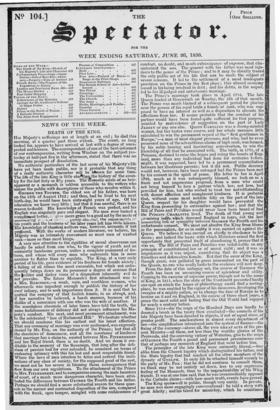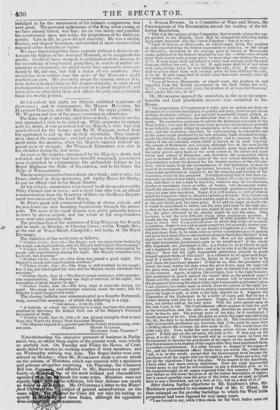NEWS OF THE WEEK.
DEATH OF THE KING.
4.1
.24
His Majesty's sufferings are at length at an end ; he died this morning, at a quarter past three o'clock. The event, so long looked for, appears to have arrived at last with a degree of unex- pected suddenness. The correspondent of one of the best-informed of our contemporaries, writing from Windsor on the subject yes- , terday at half-past five in the afternoon, stated that there was no immediate prospect of dissolution. No authentic particulars of the last scene of his Majesty's life have yet been made public, nor is it probable that any thing of a really authentic character will be lettown for some time. The life of the late King is little elselthalthe history of the coun- try for the last forty or fifty years. ThEdbinestic circle of an heir- apparent or a monarch is seldom accessible to the writers who amuse the public with descriptions of those who revolve within it. GEORGE THE Fouirm, the eldest son of his father, was born on the 12th of August 1762 - and thus, had he lived to his next birth-day, he would have be sixty-eight years of age. Of his • education we know very little • but that it was careful, there is no reason to doubt. His knowledge of French was perfect, and his • English was singularly pure and elegant. No man ever turned a compliment better, c: enve more grace to a good act by the mode of antioilacing . purely cl..irrat, the autusmerzts his youth and the business af his later years left him Fine leisure. His knowledge of claasical authors was, however, accurate, if not • Mitound. With the works of modern literature, we believe, his Majesty was as intimately conversant as most men of exalted rank—more so than most ldngs. A very nice attention to the rigidities of moral observance can hardly be asked from one who, to the vigour of youth and an• eminently handsome person, unites a complete command of for- tune, and whose will every man who surrounds him is more anxious to flatter than to regulate. The King, at a very early period of his life, gave evidence of his fondness for female society; a failing of all others the most excusable, but which not infrequently brings down on its possessor a degree of censure that the Folder and darker vices of a disposition inherently evil do not provoke. The future Monarch's first attachment was to a Mrs. RointrsoN,—a weak, vain, and worthless woman, who afterwards was impudent enough to publish the history of her own' infamy, and to seek importance from it. It is said that he quitted the company of that foolish female, in an abrupt, and, if her narrative be believed, a harsh manner, because of his dislike of a connexion with one who was the wife of another. If • the scandalous chronicle of later times have told the truth, the same fastidiousness of delicacy did not always influence his Ma- jesty's conduct. His next, and most permanent attachment, was to the celebrated "lass of Richmond Hill." We hesitate whether j we should condemn this his earliest and his latest affection. That any ceremony of marriage was ever performed, was expressly denied by Mr. Fox, on the authority of the Prince; but that all the decencies of demeanour, and all the constancy of kindness , that marriage has a claim to, existed between Mrs. FITEHERBERT and her Royal friend, there is no doubt. And we deem it cre- ditable to the memory of the Sovereign, that long after the deli- rium of passion had for ever subsided, he remained on terms of endearing intimacy with this his last and most respectable friend. Where the laws of men interfere to fetter and control the incli- nations of any class of society, for the supposed good of the rest, we must not be too severe in blaming those consequences that flow from our own regulations. To the attachment of the Prince to Mrs. FITEHERBERT, and to companions among the male haunters of court, of a much more dangerous character, have been attri- buted the differences between GEORGE the Fourth and his father. Perhaps we should find a more substantial reason for these quar- rels in the narrow and contracted disposition of the sire, compared with the frank, open temper, mingled with some recklessness of conduct, no doubt, and much extravagance of expense, that cha- racterized the son. The quarrel with his father was most inju- rious to the peace of the Prince ; and to it may be directly traced the only public act of his life that can be made the subject of severe censure. It led to the settlement of a most inadequate provision on the Prince in the first place ; this absurd economy issued in his being involved in debt ; and his debts, in the sequel, led to his ill-judged and unfortunate marriage. The Prince's marriage took place in April 1794 . The late Queen landed at Greenwich on Sunday, the 5th of that month. The Prince was much blamed at a subsequent period for placing near the person of his royal bride a female of rank, who was sup- posed to have an interest as well as a disposition to alienate his affections from her. It seems probable that the conduct of his partner would have been found .quite sufficient for that purpose, unaided by malevolence of suggestion on the part of Lady JERSEY or any one else. Queen CAROLINE was a strong-minded woman, but her tastes were coarse, and her whole manners little calculated to win the permanent regard of the " first gentleman in Europe,"—a man of most elegant presence, and who, had he even possessed none of the adventitious claims of high rank, was formed, by his noble. bearing and fascinating conversation, to win the friendship of all that he associated with. The birth, in 1795, of a Princess, destined to raise the hopes and wring the hearts of Eng- land, more than any individual had done for centuries before, might, it was supposed, have led to a permanent reconciliation between her illustrious parents ; but it did not. Public decency would not, however, have been outraged had the Prince been met by his consort in the spirit of peace. His letter to her in April 1796, much as it was subsequently blamed, we look on as a frank and not ungenerous proposal, from a man who could not bring himself to love a partner which law, not love, had provided- for him, but who wished to treat her notwithstanding with decent affection and complacent kindness. It is probable that, without- some most notable folly on the part of the late Queen, respect for his daughter would have prevented the King from proceeding to extremities against her; and that the Bill of Pains and Penalties would never have been heard of had the Princess „CHAR,LOTTE lived. The death of that young and promising lad/.. which drowned England in. tears cut.- the- last connecting fink of sympathy between GEORGE the l'ourth and his -Unfortunate consort. We must not absolve the King from blame ,in the persecution, .for so in reality it was, carried on against th "Queen. We believe it Was carried on chiefly in obedience to his desire • and indeed the haste with which Ministers seized the first opportunity that presented itself of abandoning it, proves that it was so. The Bill of Pains and Penalties was indefensible on any principle of constitutional law or of moral right ; and it was as ungenerous as it was unjust, considering that its object was a friendless and defenceless female. But that the error of the King, though great, was palliated by gross misconduct on the part of the Queen, no one who coolly looks to the evidence will now deny.
From the date of this unhappy act, the course of GEORGE the Fourth has been an unvarying course of splendour and utility. Coming to the exercise of supreme power, though not to the name of King, in 1811, when the state of the Continent presented hardly one spot on which the hopes of philanthropy could find a resting- place, he was enabled by the vigour of his measures, developing the energies of a mighty nation, so to change the face of Europe as to bestow on it and on England, in the course of three short years, a peace the most solid and lasting that the Old World had enjoyed for nearly a century before. Since 1814—.for the reign of the Hundred Days can hardly be r deemed a break in the treaty then concluded—the councils of his late Majesty have been directed to objects, if not of equal show, of greater profit. The ameliorations in almost every department of law—the simplification introduced into the system of finance—the fixing of the currency—above all, the Two GREAT ACTS of the pre- sent Ministry—all these, not less than the warlike glories of the Peninsula, and the crowning victory of Waterloo, give to the reign of GEORGE the Fourth a proud and permanent preeminence over that of perhaps any monarch of England that went before him. The principles of the late King were eminently liberal,—free alike from the Church bigotry which distinguished his father, and the State bigotry that had marked all the other members of the fl dynasty of GUELPH. In early life he attached himself warmly to the party of Mr. Fox : that he did not continue to consult them, we think may be not unfairly set down, less to any capricious feeling of the Monarch, than to the impractieability of his Whig friends. It was at one time said, that he was irreconoileably opposed to the Catholic claims—with how much truth, events have proved. The King spokowell in public, though very rarely. In private, no man was more engagingly conversational: he told a story with great felicity; and his talent for mimickrY, ,which he sometimes
it
indulged in for the amusement of his intimate companions,. was very great. The personal appearance of the King when young, as we have already hinted, was fine : his air was manly and graceful, bis countenance open and noble, the proportions Of his limb's ex- quisite. Late in life, he grew fat and unwieldy. He was a skilful, fearless, and elegant horseman, and excelled in most exercises that required either dexterity or vigour. We have thrown together these remarks without a desire to ex- tenuate the failings of the deceased Monarch, or to exaggerate his merits. Could we have stooped, in anticipation of his decease, to the ransacking of long-buried pamphlets, in search of matter eli- minatory or excusatory, we might easily have amassed a store suf- ficient to fill, not one, but half a dozen of our numbers. Our sketch has been written since the news of the Monarch's death reached our ears. We cheerfully resign the honour, such as it is, lobe derived from jobbing on the demise of royalty, to such of our contemporaries as can regard an event of so great magnitude and interest in no other light than as it affects the petty and perishable fame of a weekly journal.



























